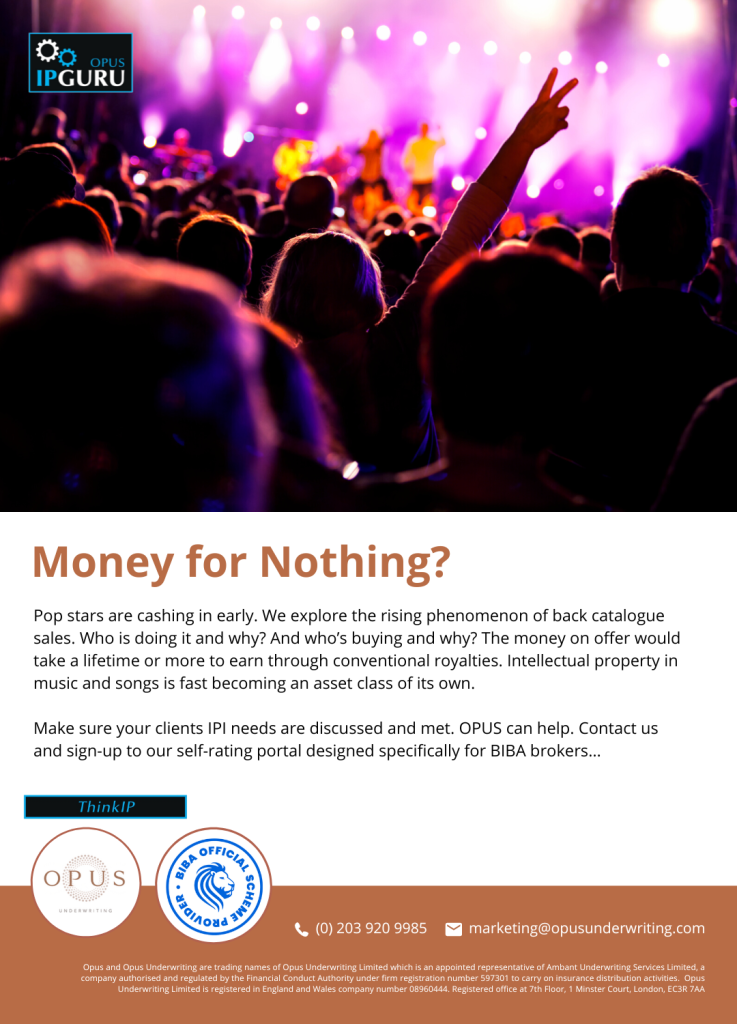I’m a Belieber
“Legacy”. A word much bandied about these days by career politicians running for the exit, commentators on deceased monarchs, and artists. Yes, artists. Musical artists have demonstrated a curious take on their understanding of the word and what it means to them. Rebellious to their core, a goodly number are opting for cash-up-front from third parties willing to buy and manage their ‘legacy’ back catalogues. I rather like their style.
Justin Bieber is reportedly the latest to harvest his legacy in used fivers. Or, more accurately, a figure allegedly around the $200m mark. Be happy for him. Try. There are lots of reasons why he and many others have cashed out. It could be a very smart move.
Let’s use a down-to-earth example to bring this into focus for mere tone-deaf mortals. You have a buy-to-let property as part of your pension play and a couple of kids who look set to inherit this and other stuff from you. Ever asked them which, would they prefer:
- A property asset that would throw-off some useful cash moving forwards but require considerable and quite possibly increasing amounts of compliance, managing, and maintaining? Or;
- The cash value of the asset up front – maybe even right now before you’re in the ground?
Hmmm, and what if, to boot, there were considerable tax advantages to having the cash up front? Now we ‘dig it’!
The Specials
In defence of the bountiful wealth for the rare few who ‘make it’, musical artists are extraordinary people. They should be cherished for not being like most of us. They are risk takers – mostly with their entire careers. Talented footballers are another example. We love them but hate what they earn. Are we just envious? We need to get over ourselves.
A musician’s wealth is not measured in the roof over their heads or a stable salary with on-target-earnings. It’s in their work. Their intellectual property. It couldn’t be a purer form of intangible wealth if it tried. So, when an opportunity arises to cash in a few chips or the whole hand – why not? Our lives are peppered with their tunes to which we attach meaning, importance, romance, memories, and joy. Musical works are the backdrop to our, by comparison, hum-drum existence. They are unique people. We expect much of them, that’s why we’re disappointed and take it personally when they offend us with an off-colour political view or, sexual misconduct or when a footballer misses a penalty.
Money Changes Everything
Defence over. So, who’s making the bucks here? Let’s get on with the financial gossip. We know who’s sold up but not always for how much. Often the sum is undisclosed. Again – we might be interested to know but is it really any of our business?
- Bob Dylan raised $300-$400m for 100% of his publishing catalogue.
- Neil Young – $150m for 50% of his career catalogue.
- Stevie Nicks sold a majority stake in her songs for $100m
- Blondie – undisclosed.
- Barry Manilow – undisclosed
- Dave Stewart – undisclosed
- Paul Simon, David Crosby Culture Club etc. etc., the list goes on…
The alleged master of them all, the legend that is Bruce Springsteen, reportedly sold his back catalogue rights for $550m.There’s a reason he’s called the “The Boss” by his industry.
Why?
Well, for the “why?”, return to the ‘backdrop to our lives’ image. There’s a view by purchasers of back catalogues that popular music is the equivalent of a memorable image. And then think how successful Getty Images has been in its strategy of ‘hoovering up’ all that is visually familiar to us.
Remember in the late 1980s when Mark Getty famously coined the phrase that intellectual property was the oil of the 21st century?
The Who
In audiological terms, can you do for popular tunes what Mark Getty has done for popular images? Merck Mercuriadis believes you can. His business, Hipgnosis, started buying up rights to legendary tracks in 2018 and hasn’t stopped since. He said:
“What I wanted to do on behalf of the entire songwriter community is to really establish music as an asset class and create a market.
“I wanted to demonstrate to the financial community that these great proven songs have very predictable, reliable income and therefore they are investable.”
I suspect he’s a man not short on Pop Star party invitations.
Companies like Hipgnosis, look to have the advantage over more traditional buyers like record labels. Mercuriadis believes his type of business is a better steward of the music it buys than legacy record labels which have a disparate set of goals distracting from the mission to manage older music libraries. He might be right. Time will tell.
Sell Out
Whether top of your game or top of the market. Now is a good time to realise these back catalogue deals. The market is shifting. Streaming has made music valuable, but it hasn’t directly enriched the artists. A songwriter can wait a lifetime to get mega-rich from traditional royalties given how they are typically spilt. Pandemics have stifled touring revenue. TikTok and other similar Apps have boosted older tracks as background music to short-form videos. Recessions abound all around the world but as one former recording executive opined;
“Even if someone loses their job, they’re still listening to music.”
And, let’s face it, the money on offer up-front is pretty eye-watering however counterculture you might have been back in the day. Look at it as an opportunity to plant more trees on the land you own but don’t personally farm.
Don’t Worry Be Happy
Go ahead, grab the cash from the corporates, talent deserves a pay day. You make us smile. Crack on.
Murray Fairclough
Development Underwriter
OPUS Underwriting Limited
+44 (0) 780 145 9940
underwriting@opusunderwriting.com
Written and researched by Ben Fairclough








